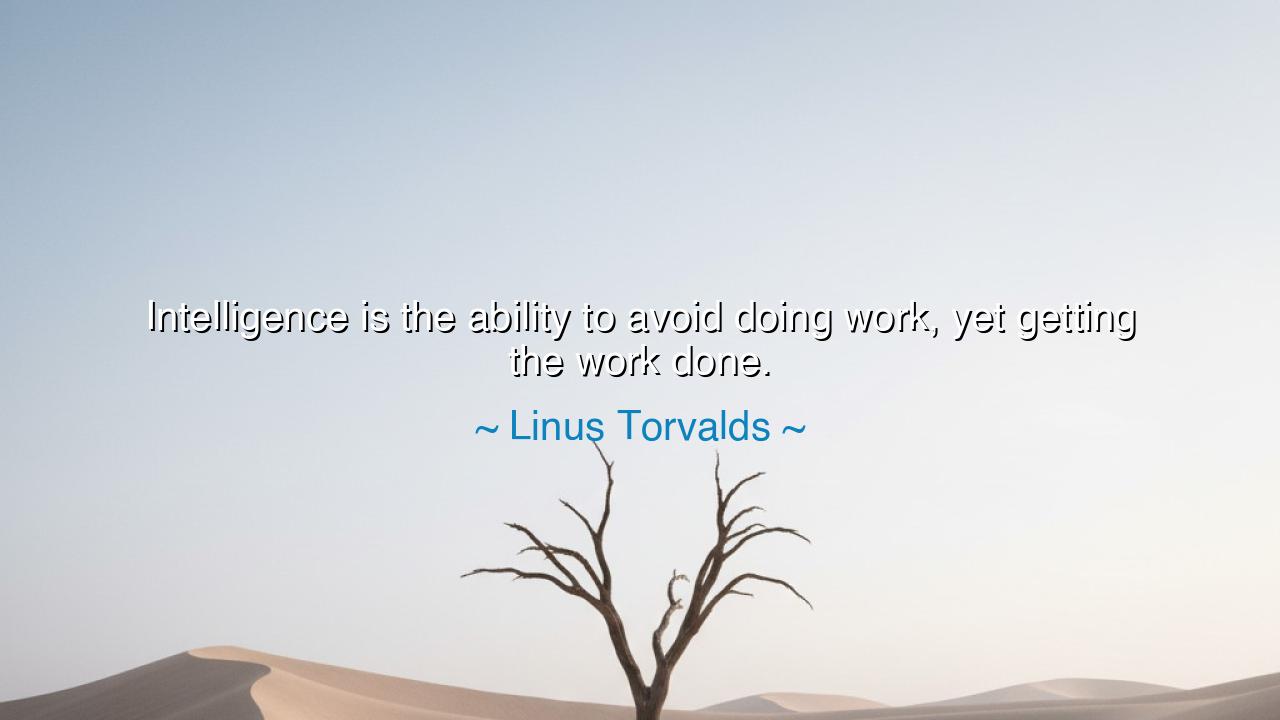
Intelligence is the ability to avoid doing work, yet getting the






The Subtle Art of Intelligent Efficiency
From the mind of Linus Torvalds, the creator of Linux and one of the quiet architects of the modern digital world, comes this paradoxical insight: “Intelligence is the ability to avoid doing work, yet getting the work done.” Though spoken with a touch of humor, these words conceal a truth as sharp as a blade. Torvalds does not praise laziness, but celebrates wisdom in effort—the mastery of achieving purpose not through endless toil, but through clarity, insight, and design. It is the art of the thinker who knows that true intelligence lies not in labor without end, but in knowing how to labor rightly.
The meaning of this quote lies in the distinction between effort and effectiveness. Many men mistake busyness for productivity, believing that greatness is measured by exhaustion. Yet Torvalds, who built one of the world’s most powerful software systems through open collaboration and elegant design, understood that the highest form of intelligence is not to do more, but to do better. To be intelligent is to see the essence of a task—to cut away what is needless, to design what is simple, and to achieve the goal with grace rather than struggle. In the language of the ancients, this is the art of the path of least resistance, not as weakness, but as wisdom: the river that flows effortlessly carves the deepest valleys.
In his world of code, Torvalds witnessed this truth daily. The mediocre programmer writes a thousand lines to solve a problem; the master writes ten. The difference is not diligence, but vision. So too in life—many labor endlessly because they have not learned to think deeply. The intelligent one pauses before acting, sees the pattern within the chaos, and acts only where action counts. Thus, his results appear effortless, yet behind them lies discipline of thought. To avoid work, in this sense, is not to evade responsibility, but to transcend inefficiency—to use the mind as a lever, and intelligence as the force that moves the world with minimal strain.
History offers countless examples of this truth. Consider the story of Archimedes of Syracuse, the ancient mathematician. When asked by the king to determine whether a crown was made of pure gold without damaging it, most would have resorted to destruction or brute testing. Archimedes, however, used the law of displacement—by simply measuring water, he solved what others could not. His famous cry of “Eureka!” was not merely triumph, but revelation: that the greatest achievements often come not from greater effort, but from greater understanding. He had avoided unnecessary work, yet fulfilled the task perfectly. This is the essence of Torvalds’s teaching—the power of intelligent simplicity.
The ancients revered this form of wisdom. The Taoists called it wu wei—“effortless action.” It was the principle of acting in harmony with the nature of things, doing only what is necessary, and allowing the rest to unfold with ease. The sage who practiced wu wei accomplished more than the one who strained against the flow of life. Linus Torvalds, in his modern way, speaks from this same fountain of wisdom: the idea that true mastery lies not in struggle, but in alignment—between thought, action, and purpose. The one who understands the essence of a task becomes like water—efficient, adaptable, and unstoppable.
Yet this path is not for the careless or the lazy. For only through discipline, practice, and clarity of mind can one discern what must be done and what may be left undone. Intelligence without integrity becomes cunning; efficiency without wisdom becomes neglect. Torvalds’s “avoiding work” is not an escape from duty, but an elevation of it—to act with precision, to waste neither time nor thought, and to achieve more by doing less. It is the difference between the craftsman and the laborer: both work, but the craftsman works with vision, and his effort multiplies itself through insight.
Therefore, O seeker of wisdom, let this be your lesson: do not glorify toil for its own sake, nor despise it, but learn its rhythm. Before you act, think. Before you build, design. Before you labor, understand. Seek to see the heart of every task, and when you find it, move with purpose and clarity. For the world is not changed by the restless, but by the thoughtful; not by those who burn themselves out, but by those who direct their fire wisely. Intelligence is not the denial of effort—it is the refinement of effort into art.
And so, when you work, work like the river that finds its way to the sea—not by force, but by flow. In this, you shall discover the ancient secret behind Linus Torvalds’s modern words: that intelligence is not measured by the sweat of the brow, but by the elegance of the mind that knows how to achieve with grace what others achieve through struggle.






AAdministratorAdministrator
Welcome, honored guests. Please leave a comment, we will respond soon